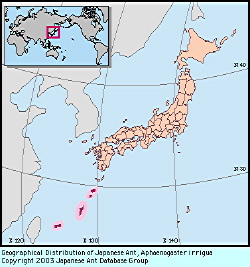
|
species
|
Aphaenogaster irrigua
|
 |
Japanese Name
|
Sawa-ashinaga-ari
|
Original Reference
|
|
Watanabe, H. & Yamane, S. (1999) New species and new status in the genus Aphaenogaster (Formicidae) from Japan. In: Identification Guide to the Aculeata of the Nansei Islands, pp. 734-735, Hokkaido Univ. Press, Sapporo.
|
Description
|
|
Total length of workers around 4 - 6 mm. Head brown to light brown, mesosoma light brown, gaster dark brown to brown, legs light brown. Scapes, mesosoma and legs relatively rather long compared to other Japanese Aphaenogaster species. Anterior portion of clypeus with transverse striae. Basal margin of mandibles often weakly serrate. Mesonotum only weakly raised, predominantly covered with punctures. Chromosome number 2n=32.
|
Remarks
|
|
Similar to Aphaenogaster osimensis, but separable by the presence of shallow, small punctures on the occiput and pronotal dorsum, and the dull surfaces of the propodeum and lateral parts of mesopleura, which are covered with striae and punctures. This species prefers moist situations; it nests in the soil in woodlands, near banks of streams and dry river beds. Foraging workers do not turn their gasters downwards.
|
|

Distribution
|
|
Nansei Is (Tanegashima I., Amami Is. & Okinawa Is.).
|
|
References
|
|
- Terayama (1999)
- Watanabe & Yamane (1999)
|
Editor
|
|
Original text by Hirofumi Watanabe and Seiki Yamane. English translation by Kazuo Ogata, edited by Robert W. Taylor.
|
|